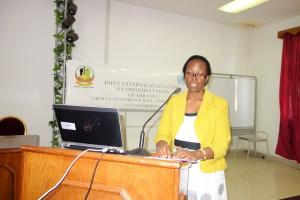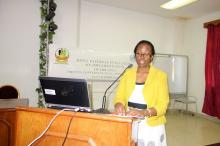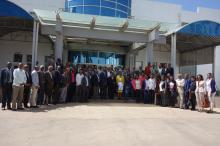Eritrea conducted the Joint External Evaluation on Implementation of IHR (2005)
Eritrea conducted the Joint External Evaluation as part of the county’s implementation of International Health Regulations (2005) from 3 to 7 October 2016 at Orotta Conference Hall in Asmara. Presiding over the official opening of the workshop, Honorable minister of Health, Mrs Amina Nurhussien stressed the main objective of the workshop to review and evaluate the status of implementation of IHR (2005) jointly with the external evaluators from WHO. Hon. Minister highlighted some of Eritrea’s accomplishments with respect to IHR (2005); such as the development of the national action plan on IHR (2005), the formulations of a multi-sectorial national emergency preparedness and response draft plan and the designation and establishment of point of entry for the country as stipulated under the IHR (2005). She also wished the participants a successful and fruitful deliberations.
In her opening remarks, the WHO Representative to Eritrea, Dr Josephine Namboze appreciated the commitment and initiative shown by the Government of Eritrea for the self-assessment of the implementation of IHR (2005) and sharing the results with all of its partners in August 2016. Eritrea further demonstrated its readiness by voluntarily requesting WHO to facilitate and conduct a Joint External Evaluation mission following this initial self assessment process. The recommendations of this Joint External Evaluation exercise would serve as the guide for the development of a new national action plan for the implementation of IHR (2005) in the coming years.
An overview of the Eritrean health system was delivered by Mr Berhane Ghebretinsae, Director General of Medical Services, who emphasized implementation along the six WHO health systems building blocks. Mr Berhane pointed out that MOH is working seriously on health and community system strengthening at all levels.
Dr Ambrose Talisuna, WHO’s JEE technical Team lead guided the process of the JEE of IHR based on the core capacities assessment tool. He explained that the objective was to ensure health security through prevention, early warning, early detection, and response to health emergencies, using an all-hazard approach that is linked to primary health care systems. Moreover, he emphasized the overarching goal as minimizing the public health and socio-economic impact of outbreaks, emergencies and disasters on member states.
Participants were drawn from various organizations including the Ministry of Health, Ministry of Agriculture, Ministry of Information, WHO, UNICEF, and other relevant sectors including civil society organizations and technical committee members of the multi-sectoral meeting.
At the workshop, presentations on each of the 19 identified technical areas were made and were followed by candid discussions and consultations between the national and external experts to reach consensus in all technical aspects in terms of areas to be strengthened and priority actions. Additionally, comments, suggestions, were incorporated and clarifications given for unclear issues.
Site visiting to health facilities, laboratories, point of entry (both seaport and airports), PHARMECOR were organized by MOH to validate the findings.
Eritrea is the 5th country to have initiated Joint External Evaluation process in the WHO African region.
The external experts highly appreciated Eritrea for the best practices amongst which were: strong political commitment and technical leadership at all levels (National, Zoba and sub-Zoba) to build and sustain the IHR core capacities which is the foundation for IHR; good coordination, communication and advocacy have been established at national and sub-national levels: relevant committees with ToRs, SoPs and manuals; and several laws and legislation also exist in the country to support IHR implementation. On the other hand, some key areas for improvement were identified at the workshop, such as: lack of a comprehensive risk assessment, risk profiling, vulnerability and resource mapping for integrated health protection using IHR; inadequate formal and institutional IHR coordination, inadequate communication and advocacy mechanisms at all levels. The WHO Representative to Eritrea and MOH Director Generals expressed their deep thanks to the experts and participants for their excellent work.
The Joint External Evaluation (JEE) is a voluntary, collaborative, multi-sectoral process to assess country capacity to prevent, detect, and rapidly respond to public health risks whether occurring naturally or due to deliberate or accidental events. Collectively, these capacities are known as “health security.” The JEE Tool and Process are key components of the World Health Organization (WHO) International Health Regulations (IHR) Monitoring and Evaluation Framework and have been developed and implemented in full concordance and collaboration with related efforts such as the Global Health Security Agenda (GHSA) and the World Animal Health Organization’s (OIE) Performance of Veterinary Services (PVS) Pathway.
Below:
01. WHO Representative to Eritrea, Dr Josephine Namboze making remarks
02. Group photo of the participants






